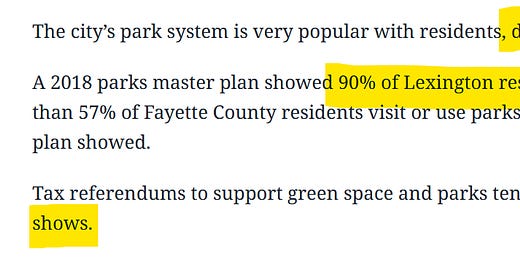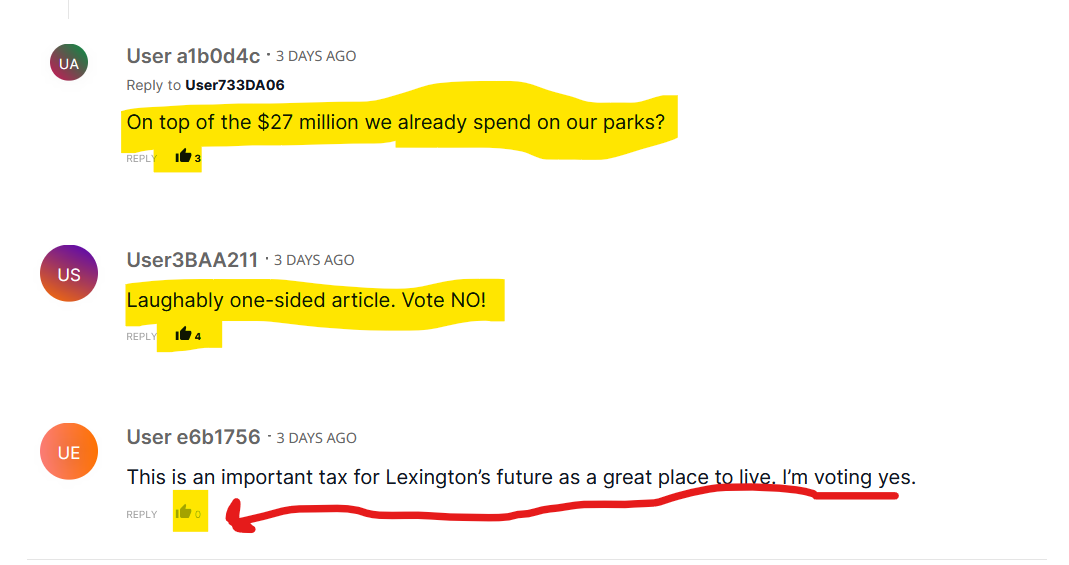Herald Leader goes all in for East Egg's park tax
On Friday, the Herald Leader finally published its long-awaited (and likely only) feature on the issues related to the parks tax referendum. And, well, it looks like the dogs may no longer be eating the local news dog food.
If you are reading this, you are most likely already aware of the details behind the referendum. Last Spring, a mostly anonymous collection of wealthy individuals, with the help of national nonprofit Trust for Public Land and a few local organizations, petitioned LFUC Council to allow citizens to vote on whether to create a new local tax to fund capital projects (but not their upkeep or staffing) at parks across Fayette Urban County. Council agreed—unanimously— with the petition and so the Parks Tax proposal will appear on the ballot next week for citizens to vote upon.
Whatever your position on the subject, the Parks Tax story is an important one deserving of local coverage. It is the only local referendum issue to appear on November’s ballot. It is the city’s first tax referendum in 20 years. Parks are, if you believe the East Egg Park Tax advocates, vitally important to 90% of residents here, and also underfunded to the tune of $120 million in outstanding capital upgrades. Further, the parks referendum comes amidst a half decade of sharp increases in property values that have increased taxes for homeowners and priced out other residents. There is a lot about the Parks Tax referendum for a local news outlet to cover.
What citizens got from Herald Leader journalist Beth Musgrave, however, was a comically slanted report that at times bordered on a liberal caricature of data-obsessed elites projecting their desires for increased taxes on everyone else.
In the entire Musgrave report, not a single critic of the Parks Tax appears. Musgrave instead hands over her entire report to no fewer than five separate public advocates of the tax, who in addition to providing their reasons to support the referendum, are also used to dismiss any potential countervailing views. Score it at home: 5-0. That’s terrible.
We get from the L-FUC parks department the blindingly obvious and oddly specific data point that 90% of us use parks.
We learn through another weirdly specific data point, this one supplied by the national nonprofit Trust for Public Land, the irrelevent figure of an “83% success rate” for all parks tax referendums. (Read—don’t step out of line, FUCer. Everyone else is doing it.)
We learn from Vote Yes for Parks, the marketing group formed to push the tax, that it has collected over $260,000 from individuals, who are left un-named, and partnered with nonprofit groups, who are named.
We learn from David Lowe, the advocate “who spearheaded the ballot initiative,” that a new tax is the only way to ensure that our parks get funded. From Lowe, we also learn that the $40 million+ in private fundraising collected last decade for downtown’s TB Commons Park is simply “not possible” to do for other parks.
The proposed parks tax, Musgrave has Lowe conclude, is an “equitable” solution for the city to catch up on its left behind parks.

We learn from Parks Tax advocate Alison Davis, of the University of Kentucky’s Center for Economic Analysis of Rural Health, that “supporting place-based development [like parks] is critical for attracting and retaining workers.”

For a news report, this is like reporting as fact the information that comes from the campaign websites of Donald Trump or Kamala Harris, or from their surrogates. It is press-release journalism at its most grating.
All this may have been sorta OK if Musgrave had spent any time considering counterposing views. You know, something like a Trumpy view to offset Kamala surrogates. (Or, if you prefer, a Kamala view to offset the Trumpy-ness.) Amazingly, though, Musgrave’s reporting, which got through her editors at the paper, references no legitimate opposition at all.
“No organized opposition,” say some faceless leaders of a marketing group
How do we know that there is no legitimate opposition?
Because, Musgrave reports, the advocacy group Vote Yes for Parks (formed explicitly to market the Parks Tax) states that there is no organized opposition to their proposal! Musgrave does not cite a human for this factoid. She makes the claim by citing a faceless marketing organization “leader” (or “leaders”).
Quick. Do a thought experiment with me, blue dot progressives: a Donald Trump Super PAC says there is no opposition to his views on the border wall. Does an opposition exist? Musgrave says no, apparently. TINO. There is no opposition. We must believe the SuperPACS.
The key word here is “organized.” Is organized opposition the same thing as opposition? (And are these the same descriptors for “holds a different viewpoint”?) The former, organized opposition, is represented by Vote Yes for Parks, a group put together with a measly $260,000 raised across a couple months by a small group of wealthy bluegrass families and their play foundations. I mean, bro, anybody can do that! Who doesn’t have a spare couple grand lying around the house to make change at the ballot box!
The latter, what I guess would be termed the disorganized opposition, is somebody like me, a resident who spent his scarce free time researching around the issue and composing dozens of articles on the subject of Lexington parks, going back now almost 15 years. I do not have personhood to the richies who run Vote Yes for Parks. This view is evidently shared by our Herald Leader reporter.
Previously, when coverage of these sort of East Egg ideas get circulated by local media, Lexingtonians have eaten the dog food. In public forums, we were generally OK in 2010 when Herald Leader journalists and other civic leaders explained to us that spending $200+ million to hold the “Olympics of Horse Eventing” (shown on ESPN 3) was a bold investment to transition the city from Thoroughbred capital of the world! to Horse capital of the world! Or with the confident explanation in 2013 that good urban design principals of scale and taste underlay the garish $350 million Rupp and Convo Center renovation. Or that it was natural to name an apparently private park and bike trail as a “commons” in 2014, and to sell it as a local initiative, one designed by a Brooklyn starchitect, which just might boldly (it’s always boldly) solve the city’s alternative transportation issues.
With the Parks Tax proposal, though, the local FUCers do not appear to be eating the dog food. Read all the way to the end of Musgrave’s organizational reporting, and then take a look at the comments. Sixteen of them in all. For the Herald Leader, which at best can expect 1-2 reader comments for its news articles, this approaches Reddit territory for reader engagement. Nearly all of them against the proposal. And for a variety of different reasons.
There are themes, but on the whole The Disorganized voice a diversity of opinions. I have screen-shotted some below, because you people voting on the Parks Tax should be informed about the views of your neighbors, not just of the rich folks with enough spare money and leisure to form official advocacy groups for laundering their views into our city’s official public record.
Will our local reporter Beth Musgrave bother to acknowledge these voices? Or are we beneath her, simply unworthy of her reporting?
***















